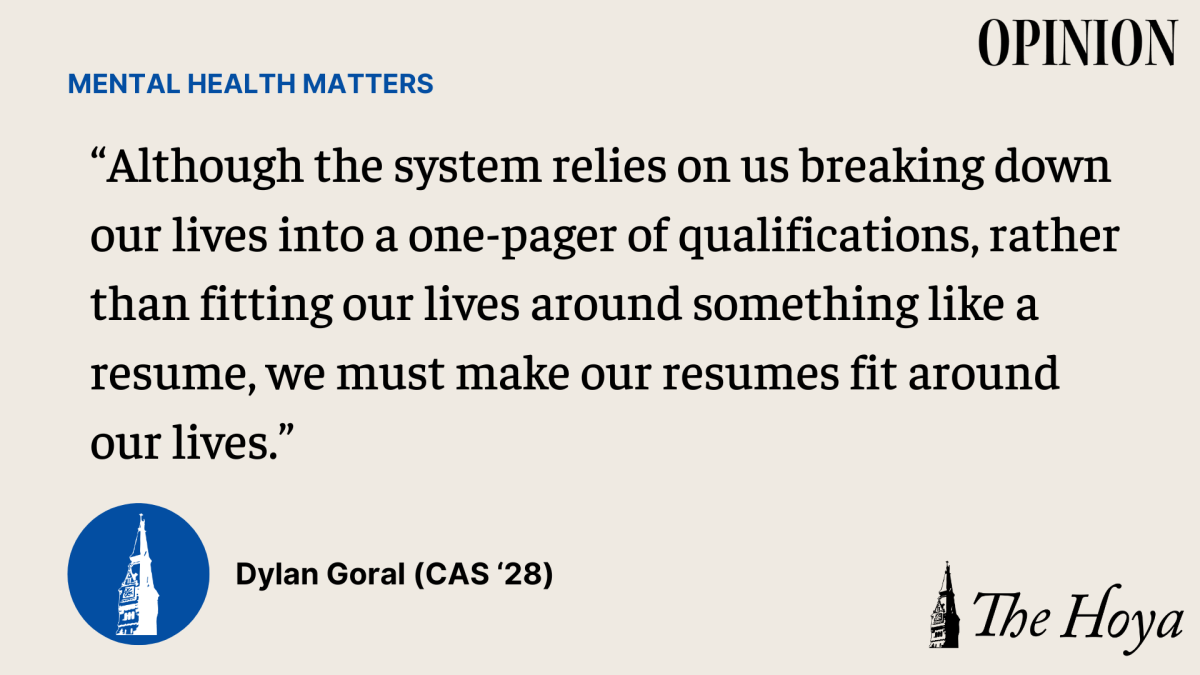
Last week, I reached an exciting yet anxiety-inducing milestone: my first networking call. I know the idea of networking for internships and future jobs seems synonymous with the Georgetown University experience, but as I rolled out of bed to hop on this Zoom call, I was consumed with embarrassment — this was my first time doing something my friends and classmates seemed to be doing every day.
It was difficult to admit that I had little professional experience, with the only legitimate bullets on my resume being a variety of freelance music gigs. I lacked a network and a resume, things it felt like everyone else had.
Even when he asked me who I was beyond a list of credentials — what my story was — I only felt worse. I told him my story was a messy one. It’s one about a boy who grew up with no father and a drug-addicted mother. It’s about the long time the boy spent in the foster care system, and even longer time healing from the damage it did to him. It’s a story about spending the entirety of high school fighting anxiety, depression and attachment disorders instead of worrying about what would look best on my resume.
To my surprise, he smiled and told me something I never would’ve expected to hear: Your story is your resume. He suggested that I shouldn’t treat my resume as a list of jobs, internships or activities, but as experiences that have contributed to who I am. My resume should be my story, and my struggles should be my strengths.
Regardless of whether or not this call leads to a job, I’ve gained clarity about this insecurity. The key is to put aside the things that you do — the jobs, internships, accolades — and just be who you are. Doing this will allow you to create a resume that fits around your life, rather than fitting your life around your resume.
In an environment filled with people who embody a constant “go-go-go” mentality and are obsessed with professional success, it’s disheartening to think that I couldn’t compete. I’ve always doubted that my story would ever be taken as seriously as the resumes filled with internships and nonprofit work. When it seems like I’m just a kid from a rough background who likes to play music, I feel daunted by my peers who seem to have resumes reflecting what they want to do in their lives.
But, even at Georgetown, I know I’m not alone in my struggle. When I told one of my classmates what this installment was going to be about, he said that he wished being himself mattered more when applying for internships or jobs. Jokingly, I told him that my “sob story” was good enough to cover up the holes in my high school resume, seeing as I ended up here at this university.
Even though I was only making a joke, the sentiment reflects the critical notion that there are ways in which my experiences have indirectly benefited me. And it might shed light on how people who share my experiences can use their stories as their credentials.
For instance, someone struggling with anxiety may be better equipped to handle interpersonal or team-related issues at work because they have a deeper understanding of how to solve personal conflicts. Someone who has suffered from depression might be more empathetic to their co-workers. And people who grew up in broken or unstable homes might better understand the importance of setting positive examples and being good workplace role models for others.
The skills and knowledge you can learn about yourself or others through these struggles can be just as valuable of an asset to a resume than any internship. Your stories reflect enriching, real-life experiences. Running errands and filing paperwork for a summer are not the only things that make you qualified; navigating conflict resolution and displaying emotional intelligence reflect your lived experience.
Although the system relies on us breaking down our lives into a one-pager of qualifications, rather than fitting our lives around something like a resume, we must make our resumes fit around our lives.
Dylan Goral is a first-year in the College of Arts & Sciences. This is the third installment of his column, “Mental Health Matters.”